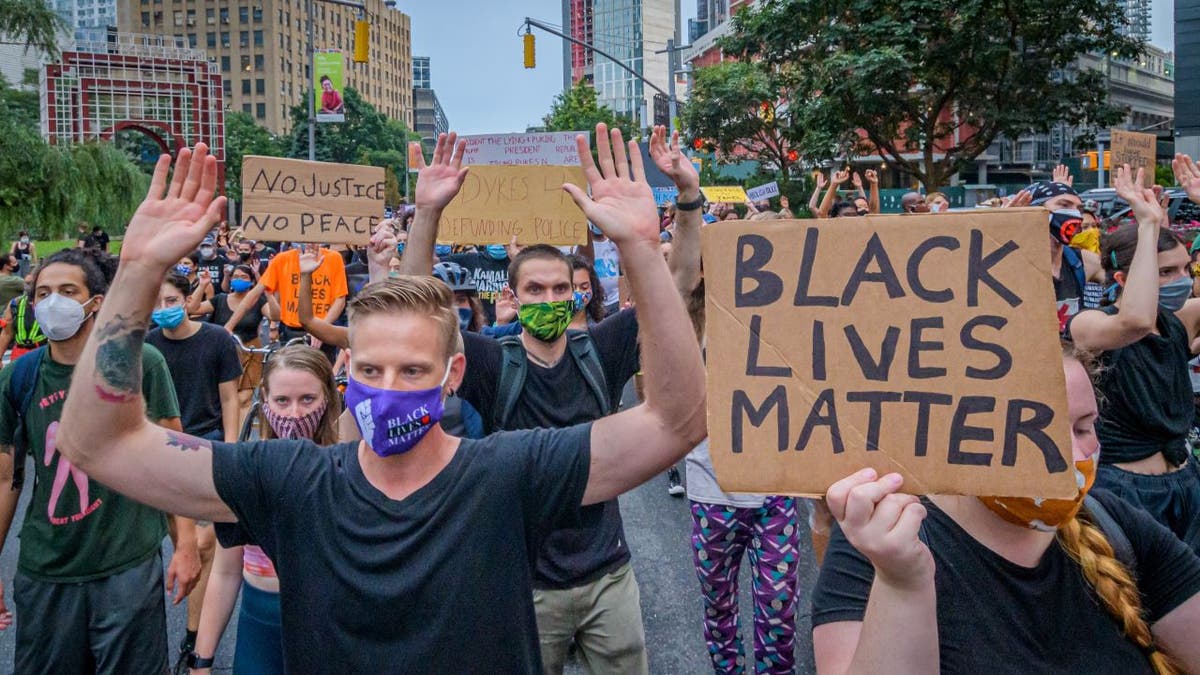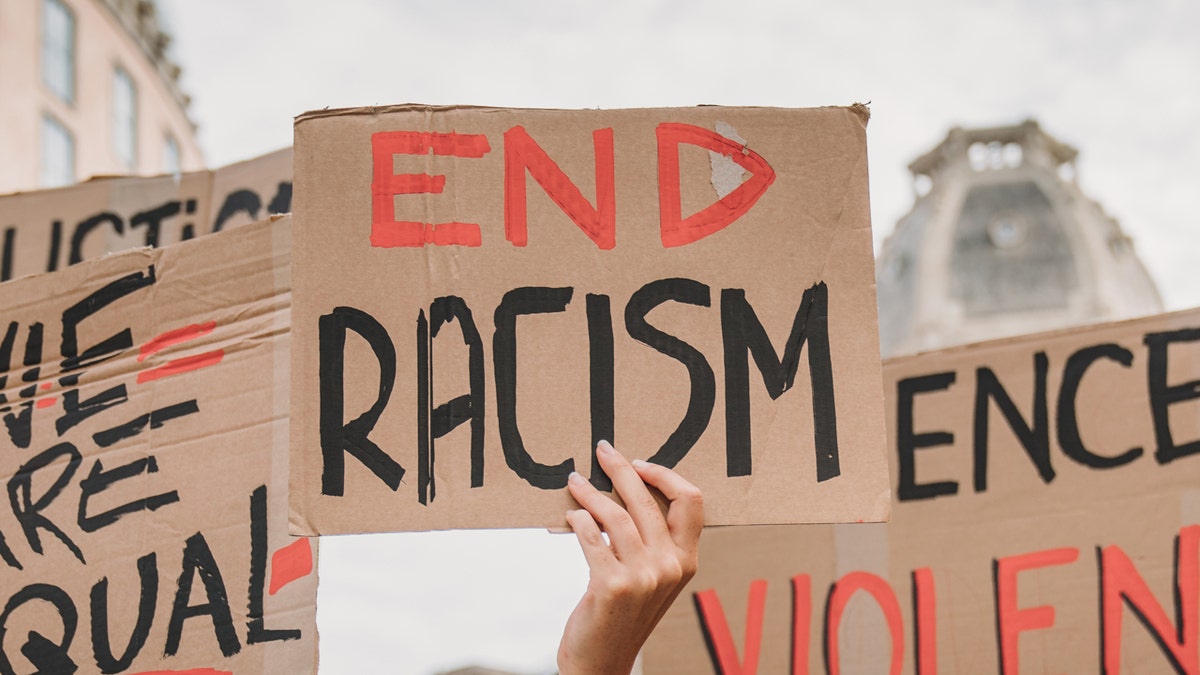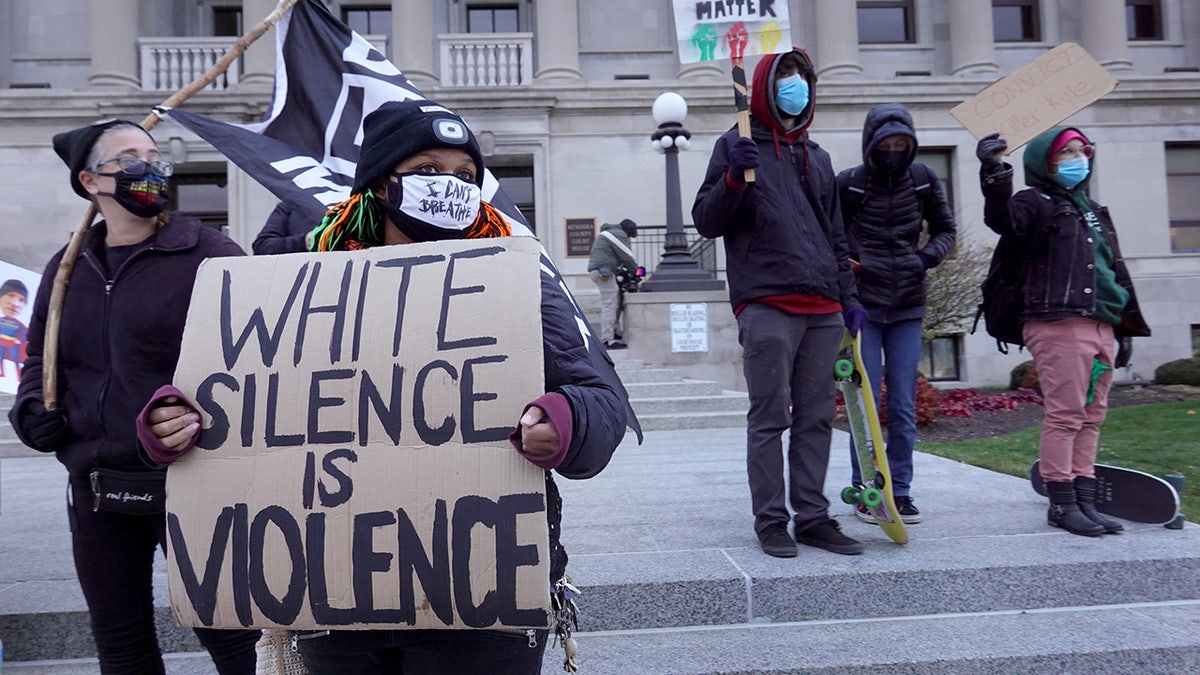

A new book aims to explain why White liberals and White conservatives often disagree on what is considered "racist," or "sexist" and explains how both sides can better address these issues in society.
In "Is it Racist? Is it Sexist?: Why Red and Blue White People Disagree, and How to Decide in the Gray Areas," sociologists Jessi Streib and Betsy Leondar-Wright interviewed dozens of White voters to see how they make judgment calls on these hot-button issues.
Participants were presented with real and hypothetical scenarios and asked to judge whether the situation or person was "racist" or "sexist."
Hypothetical examples in the book include a cartoon showing a male patient lying in a hospital bed and addressing the female doctor who enters his room as "nurse," and a White police officer shooting a Black teen who was holding up his cell phone, with the officer claiming he thought it was a gun.

A participant holding a Black Lives Matter sign at the protest. A coalition of activists and organizations led by activist, poet, and organizer Selu gathered across New York City in 2020. (Erik McGregor/LightRocket via Getty Images)
The authors also ask participants to judge if real-life incidents were racist, such as when President Trump told the NFL in 2017 to "get that son of a b---- off the field," referring to NFL players who were kneeling in protest of the National Anthem, following the example of former San Francisco 49ers quarterback Colin Kaepernick.
The authors recruited 127 people, between the ages of 35-59, from various social classes and regions of the country to participate in their research for the book. They posted digital flyers in non-political online groups, inviting people to participate in a general survey about American beliefs. The participants were paid a small price for a 2-hour interview and did not know the topic of the survey beforehand.
Co-author Betsy Leondar-Wright told Fox News Digital that she and Streib were inspired to write the book during the first Trump term, as backlash to the #MeToo and Black Lives Matter movements grew. As sociologists, they wanted to learn why there was a growing partisan divide among White voters on these issues.
Through their interviews, they determined that people fell into one of two broad categories: the "acquitters" and the "convictors."
NY TIMES ADVICE COLUMN ANSWERS WHETHER DATING WOMEN OF COLOR CAN ADVANCE ‘ANTIRACISM’

CriticalRace.org, which monitors CRT curricula and training in higher education, has cataloged over 700 institutions of higher education to examine DEI activities on campus. (iStock)
Acquitters take accusations about racism and sexism on a case-by-case basis and examine the evidence through an "investigative" method. They are open to exploring alternative explanations before tending to find the person accused of racism or sexism, innocent. Acquitters tend to be conservative.
Alternatively, convictors are people who notice patterns in society and analyze situations involving race and sex through an "algorithmic" method. These people tend to side with the accuser and find the person accused, guilty. Convictors tend to be liberal.
Leondar-Wright said both sides could learn from each other on how to better tackle these topics.
She argued that acquitters need to recognize the patterns of racial disparity within society that can be seen in health care, housing, criminal justice, and K-12 education, and the patterns of gender disparity in pay, treatment by religious dominations and family responsibilities.
But the convictors could learn from the acquitters' investigative method as well. Convictors can make wrong judgment calls when they fail to ask questions, the author argued.
ACTRESS SLAMS ‘FICKLE’ #METOO MOVEMENT, CALLS OUT HOLLYWOOD FOR HAVING ‘NO MORAL BACKBONE’

Whether it's at family gatherings, on social media, or in the workplace, we're faced with these judgment calls all the time, author Betsy Leondar-Wright said, so it's important to examine these issues carefully and thoughtfully. (iStock)
The authors recommend adopting a "surveyor" approach, instead. This means not automatically judging whether someone is racist or sexist based off of one incident, but looking for patterns of behavior, before making a judgment call.
Leondar-Wright said everyone will be confronted with these scenarios at one point or another, so both convictors and acquitters should respectfully listen to the other side and not presume the worst about people they disagree with.
She said her conversations with acquitters in the book opened her eyes to biases she held towards people she disagrees with, politically.
Because she identifies as a "convictor," Leondar-Wright said it was "really surprising" how often even the most conservative people spoke up and took action against racism or sexism in their own lives.
The author recounted how one conservative woman named Alice said she took in and raised her Black friend's daughter after her friend went to prison. When Alice's mother showed racism toward the girl, Alice cut off her mother in favor of her foster daughter's well-being.

White voters came to hold more partisan views on racism during the height of the Black Lives Matter movement, the authors say.
Leondar-Wright said she wouldn't have expected someone with Alice's beliefs to take such a strong stand against racism. She found this conversation and others, "encouraging."
"I do think there's a lot of racism and racial inequality in our society and a lot of gender inequality. And so I'd like to help move people in the direction of seeing those patterns, those disparities," she told Fox News Digital. "I ended up a lot less hopeless about how possible that is than I was when I started out."
